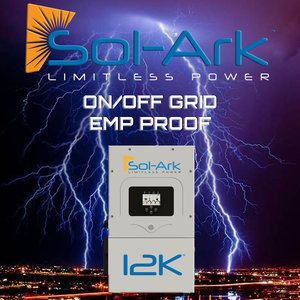Compact Refrigerator Freezer For Solar Power Energy System
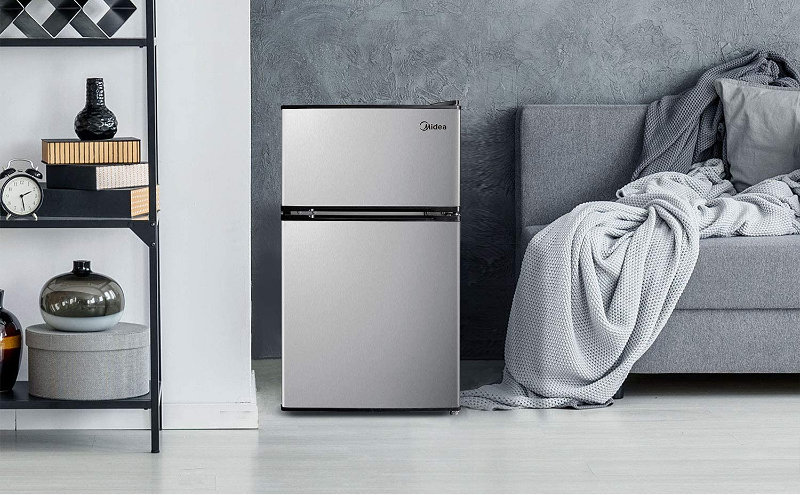
A compact refrigerator – freezer will use a lot less energy than a full size fridge. This makes the compact refrigerator a good choice for some off-grid applications. A part time cabin. A “tiny house” equipped with solar panels and a battery system. Or maybe just a emergency backup plan for power outages.
I’m going to simply explain how to figure this stuff out. How much energy that a compact refrigerator freezer will use. What size solar panels (how many watts). The battery or batteries. Also, the right inverter to operate a compact refrigerator.
I will provide one example system. You may apply the principles to any other, as you research your own.
Best Compact Refrigerator Freezer For A Small Cabin
First, the fridge! Which one? There’s a lot to pick from. Personally, I wanted a compact refrigerator that has a separate freezer. Why? Because the freezer portion will function better that way. It will get cold enough to freeze foods.
Anyway, so I picked this one:
Midea 3.1 Cu. Ft.
(view on amzn)
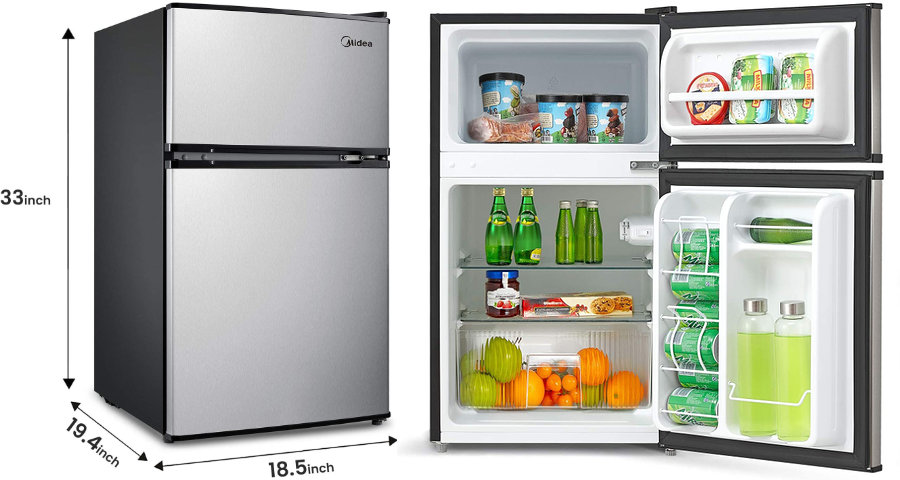
Yes, it’s small. 3.1 cubic feet. 2.2 for the refrigerator and 0.9 for the freezer.
So here’s the important thing… How much energy does this compact refrigerator consume? Why? Because this directly affects the requirements of your batteries, panels, and inverter. So how do we figure out this important information? What are we looking for?
Energy Consumption of Compact Refrigerator
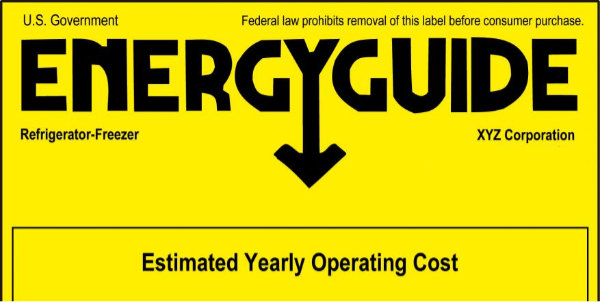
Watt Hours. How many watt hours it consumes in a 24 hour day. How do you find out? Well, look for the Energy Guide rating. It will provide a number for kWh in a year (kilowatt hours). Then, simply divide that number by 365.
The compact refrigerator freezer I’ve chosen above has a Energy Star annual consumption of 270 kWh per year. Divide it by 365. That’s 0.74 kWh per day. Or, 740 watt hours per day.
As a reference, I had measured my full size refrigerator (20 cubic feet) awhile ago. It consumes 1,400 watt hours per day. As an aside, I measured one of my chest freezers (a 9 cubic foot model) which consumes 600 watt hours per day.
The tag on this compact refrigerator says it draws 80 watts. But that’s when it’s cycled “on”. (The compressor cycles on and off throughout the day). Note, the short “startup” inrush current (watts) will be more. We’ll talk about that in a second regarding the inverter…
[ Read: ‘Kill A Watt Meter’ How-to Measure Power Consumption of Appliances ]
Batteries For a Compact Refrigerator Freezer – Off Grid
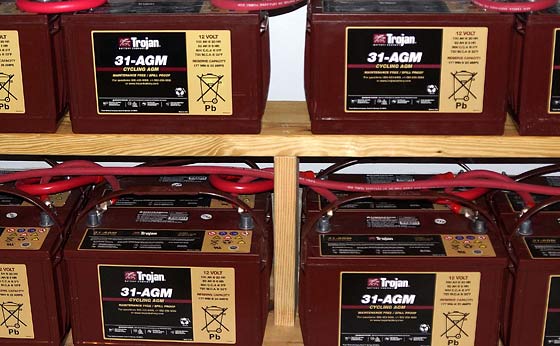
I’ll do the batteries next. Why? Because this will be the primary source of energy, day or night, for the fridge. And you need to ask, and answer, a few questions to yourself before you go on…which will determine the size of your battery or battery bank energy storage.
Margin. How much margin do you need? In other words, how long do you wish the compact refrigerator to operate without adequate sunlight on your solar panels? It needs to “at least” make it through the night, right?
What if it’s winter, when we do not get many hours of daylight, and the sun is much lower in the sky?
What about cloudy days or stretches of bad weather? These factors can be extremely significant. It depends on your goals here.
I won’t get into all the various detail of different types of batteries and their pros and cons. That would take too long for this example post. I’ll just say that purpose-designed lithium batteries are great. But expensive. Lead acid batteries are the cheapest, but come with certain drawbacks that could be problematic. Do your research.
In my example, I chose 12-volt AGM batteries (a type of lead acid battery that’s safe for indoors). Why? Because that’s what I already have (grin).
How Many 12-Volt Batteries Do I Need To Run A Compact Refrigerator?
Earlier I said this compact refrigerator uses 740 watt hours a day.
The typical 12 volt lead acid battery (I will use my Trojan AGM’s as an example) are rated at 100 Amp Hours. To convert that to Watt Hours, just multiply 100 (amps) times 12 (volts) which equals 1200 watt hours. That’s for one battery in this example.
That’s not enough for this! Why? Because you do not want to discharge a lead acid battery below 50% (will greatly reduce battery longevity). So, looks like we’ve got about 600 watt hours here at 50% discharge. Not enough…
Just do the math. Two of these batteries in parallel will give me 1200. Three, 1800. Four, 2400. So it depends on the answers to your earlier questions… How long does this need to operate without adequate sun to recharge?
Four 12 volt batteries will give me about 3 days (2400 / 740). See how that works? Two 12 volt batteries will give you 1.6 days. Remember, this is at a 50% max discharge of your batteries. Note that lithium’s can go way down to 80% without a problem.
What Size DC to AC Inverter For Operating A Compact Refrigerator Freezer
This is pretty simple. Earlier I said this fridge draws 80 watts. Even if you doubled your margin, that’s only 160 watts. No big deal…
There are lots of inverters to pick from. Get a “pure sine wave”. That will be better for electronics.
Will you be operating additional equipment beyond just your compact refrigerator? That extra power will need to be factored into all of this. For the sake of picking an inverter, for this example I’ll choose a 300 watt DC – AC inverter. I like “margin”.
There are cheap one’s, middle-of-the-road choices, and more expensive inverters. I like “Samlex America”. I have one of theirs which I have used for various purposes (600 watt version). However they’re a bit expensive. So for this example I will choose what looks to be a good mid-grade inverter.
BESTEK 300Watt Pure Sine Wave
(view on amzn)
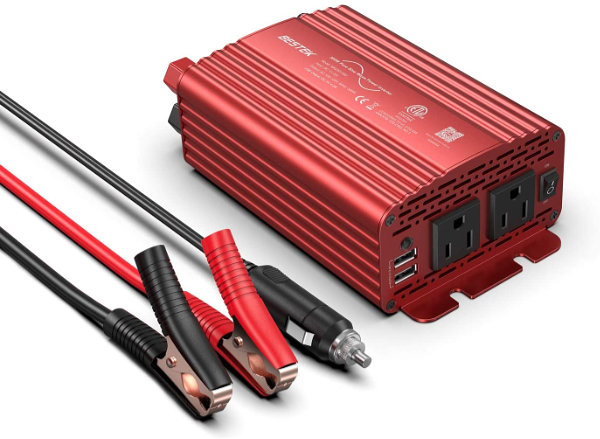
How Many Solar Panels To Run A Compact Refrigerator Freezer
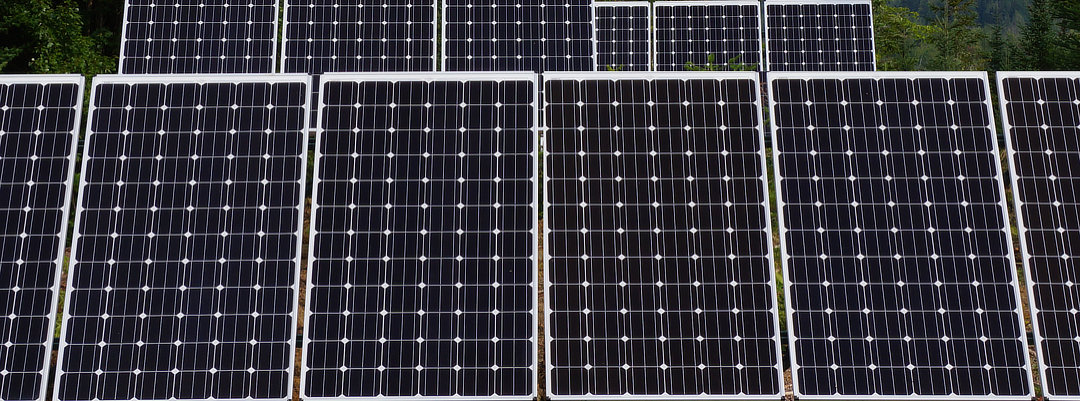
Regardless of what you decided upon for the battery bank size, it will need to be charged up by solar panels (and a charger).
Again, there are lots of choices how to handle this. And it also depends on your ultimate goals here. So I’ll just keep it simple…
How many solar panels will you need to run a compact refrigerator? For this example, I will simply use 100 watt solar panels to keep the math easier.
What’s Your Worst Case Scenario?
First, I recommend that you consider your “worst case” scenario for available charging sunlight. This obviously depends on your goals. So lets just say it’s winter time. Best case, lets say you might get 4 hours of good charging on a sunny day during winter months in northern latitudes. Obviously this varies. And obviously you’ll get LOTS more hours during the summer.
How Many Watts Of Solar Panels?
Okay, 100 watts (one solar panel) for four hours would theoretically deliver 400 watt hours of energy into your battery bank. It will be less than that because of inefficiencies, but I’m not going to get into all that.
200 watts of solar panels for four hours will give us just enough to operate that compact refrigerator freezer for a day. However, we also need to charge those batteries. So, it’s not enough.
400 watts of solar panels will give us 1600 watt hours in our “worst case example” of 4 hrs. good charging sunlight during a winter day. You see how this works? You need to play with the numbers. 1600 watt hours minus 740 (for the compact refrigerator) leaves a bit more than 800 watt hours to charge batteries. That extra will give you one extra day.
Lets say you used four 12-volt batteries. Earlier I showed you how that’s about 2400 watt hours of storage (at 50% discharge), and will give you about 3 days on that compact refrigerator before needing a recharge.
800 watts of solar panels will give you those three extra days of charge plus an operational day of the fridge (under the “worst case” scenario that I hypothesized above. See how this works? It’s all playing with the numbers. Your requirements.
Ultimately, Your Requirements Make A BIG Difference
It makes a BIG difference if you shave off a day or two of battery storage requirements. Or the time of year, hours of available sunlight, your climate, etc… Big differences.
My point here was to try and illustrate how to figure out what you need. To provide perspective as to what it takes. In this example, to operate a small compact refrigerator / freezer “off grid”. The principle can be applies to anything…
One last thing, a comment regarding the exact compact refrigerator shown above. Looks like someone else had the same thing in mind…
“I bought this after exhaustively searching for a small energy efficient refrigerator to use in our cabin in the CO mountains that has 350W of solar panels and a 12V input, 500W sine-wave inverter. Its Energy Guide says it uses 270kWhr of electricity per year. That’s 740Whr/day which, for our cabin, is only about 2.5 hours of sun/day, counting conversion losses. I have a watt meter and confirmed it is that energy efficient. We really wanted a unit with a separate freezer section and this one works great. It’ll freeze two trays of ice cubes in a few hours.”
[ Read: How-to Calculate Amp Hours – Watt Hours of Battery Bank ]
[ Read: Solar Power and Energy Requirements – How To Calculate Your Needs ]

